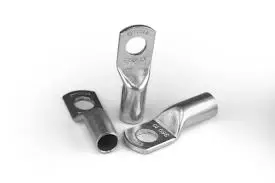Categories
- Lugs-Connector(0)
- 1
Description of Lugs
Lugs are metal connectors used for attaching wires or cables, typically in electrical systems and equipment. They come in various shapes such as round, square, or other forms and are designed to secure the conductors through bolts, screws, or welding. Lugs are capable of withstanding high currents and are commonly used in power transmission, electrical equipment connections, and maintenance work.

Lugs
Lugs are electrical connectors used to terminate wires and connect them to various components, such as terminals, busbars, or other lugs. They are essential for ensuring secure and reliable electrical connections in a wide range of applications. Here’s a detailed overview:
Types of Lugs
- Ring Lugs: These have a circular ring that is designed to be bolted or screwed onto a terminal. They provide a secure connection and are commonly used in automotive and industrial applications.
- Spade Lugs: Also known as fork lugs, these have a forked end that allows for easy attachment to a terminal. They are ideal for quick connections and disconnections.
- Bullet Lugs: These feature a cylindrical shape that allows for easy plugging into a matching connector. They are often used in wiring harnesses and for connections that may require frequent disconnection.
- Pin Lugs: Designed with a pin that can be inserted into a terminal block or socket, pin lugs are used in applications where space is limited.
Materials and Features
- Materials: Lugs are typically made from copper, aluminum, or other conductive materials, often plated with tin or gold to enhance conductivity and prevent corrosion.
- Insulated vs. Non-Insulated: Insulated lugs have a coating that provides electrical insulation, preventing short circuits and protecting against accidental contact. Non-insulated lugs are used in applications where insulation is not required.
Applications
- Electrical Systems: Lugs are widely used in electrical panels, battery connections, and in the wiring of motors and appliances.
- Automotive: They are commonly found in automotive wiring harnesses for secure connections between various electrical components.
- Industrial Equipment: Lugs are used in machinery and equipment to connect power cables to control panels and motors.
Advantages of Using Lugs
- Reliability: Lugs provide a strong and stable connection that can handle high current loads.
- Ease of Installation: They simplify the process of connecting wires to terminals, making installation quicker and more efficient.
- Versatility: Lugs come in various sizes and types, making them suitable for a wide range of applications and environments.
In summary, lugs are essential components in electrical systems, providing secure connections that ensure reliable operation across numerous applications.












